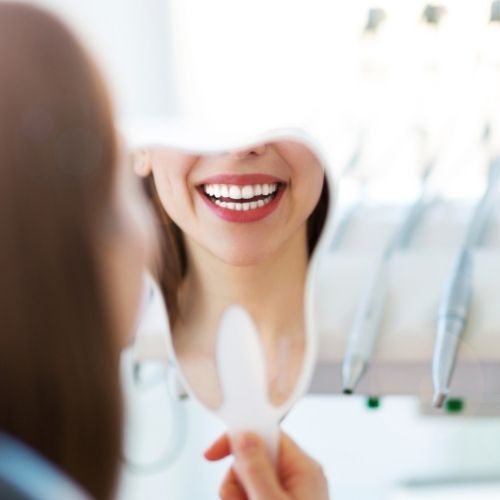- Can You Reverse Gum Recession?
Is it Possible to Reverse Gum Recession?
Teeth looking a little longer than usual? Your gums may be receding. Gum recession can occur due to several factors, including cleaning your teeth too hard, grinding your teeth, neglecting your dental hygiene, failing to treat misaligned teeth, and having an unhealthy lifestyle. Receding gums can lead to an even bigger problem if you’re not too careful. If your gums are sore, you’re probably wondering how to fix this problem. But can you reverse gum recession? Continue reading to find out, or contact your dentist in Pinellas Park, FL.
Is It Normal for Gums to Recede?
When it comes to protecting your teeth, your gums perform two crucial responsibilities. For starters, your gums are what binds your teeth to the jawbones. It also protects your cheeks and interior gums. As your gums pull away from your teeth or wear out, it produces gaps that reveal and expose the tooth roots. In some cases, “pockets” form between the teeth and the gum line, and bacteria and food accumulate in these gaps. Gum recession raises your chances of acquiring tooth decay and, in the worst-case scenario, losing your teeth.
Is it Possible to Reverse Gum Recession?
So, is it possible to reverse gum recession? Receding gums, unfortunately, will not regrow on their own, explains Dr. Wade. When your gums recede, the lost tissue is gone for good. This is why you must maintain a healthy oral health practice, which includes brushing your teeth twice a day, flossing once a day, and visiting your Pinellas Park dentist on a regular basis. Concentrate on preventing gum recession rather than reversing it. Your gums may suffer irreparable damage if you neglect your oral health.
Treatment for Receding Gums
If your gums are receding substantially, your dentist or periodontist can discuss restorative dentistry treatment options with you. Gum recession can be treated using a variety of methods, including:
Tooth Scaling/Root Planing:
If you have mild gum recession, your dentist or hygienist may do tooth scaling or root planing to deep clean the area. Plaque and tartar will be removed from the exposed area of the tooth as well as below the gum line. In addition, to discourage bacteria buildup, your dentist may carefully remove the gum line and smooth the exposed tooth root. Our friend Dr. Josh Eastham, a dentist in Grand Junction, CO, adds root scaling is one of the most effective ways to treat gum recession.
Open Flap Dental Treatment:
If calculus has accumulated deeply in pockets caused by gum recession, your dentist or periodontist may choose to fold back the afflicted gum tissue in an “open flap” treatment. Then, during a deep cleaning process, dangerous microorganisms are removed. To prevent the formation of pockets in the future, the jaw bone may be modified. The gum tissue is then fixed in place, close against the tooth, in order to remove or reduce the pockets.
Regeneration:
Has gum recession ruined your jaw bone? In this instance, your dentist or periodontist may recommend bone and gum tissue regeneration. First, your gum will be folded back to allow bacteria to be removed. The afflicted area will next be treated with a regenerative material (such as graft tissue or tissue-stimulating protein) to assist your body to spontaneously rebuild bone and tissue. The gum tissue will next be fastened against the teeth.
Gum Tissue Graft:
During this surgical operation, your dentist or periodontist will remove gum tissue from one area of your mouth (such as the top) and transfer it to cover the exposed tooth roots. Before the new tissue is attached, your teeth will be thoroughly cleaned to remove bacteria and dirt. There are various types of gum graft operations available; your dentist or periodontist will be able to recommend the best one for you.
So, if you try any of these treatments, keep in mind that you have not solved the problem permanently. Did your gums recede as a result of brushing too hard, using a hard-bristled toothbrush, or ignoring your oral health? Was it crooked teeth or a smoking habit that caused the problem? Whatever the cause, you’ll need to address the underlying problem to keep your gums from receding again.
How to Prevent Further Damage
While it is upsetting that gum recession cannot be reversed, it is reassuring to know that you can prevent more harm. So, if your dentist mentions that your gums are receding, don’t waste any more time. Instead, concentrate on how you can protect and maintain the health of your gums. You don’t need to do anything unusual; simply follow these straightforward guidelines:
- Brush your teeth with a soft-bristled brush twice a day. Don’t do it too hard.
- Floss your teeth at least once a day.
- Visit your dentist twice a year for dental cleanings
- Address concerns such as tooth grinding and tooth misalignment.
- Tobacco and smoking should be avoided.
- Consume a well-balanced diet.
So, now that you know you can’t reverse gum recession, you can take the right steps to get back on track. Contact Park Boulevard Family Dentistry in Pinellas Park, FL, for information on our dental services.








